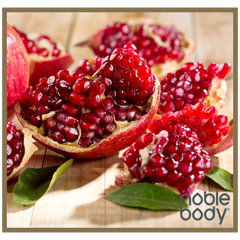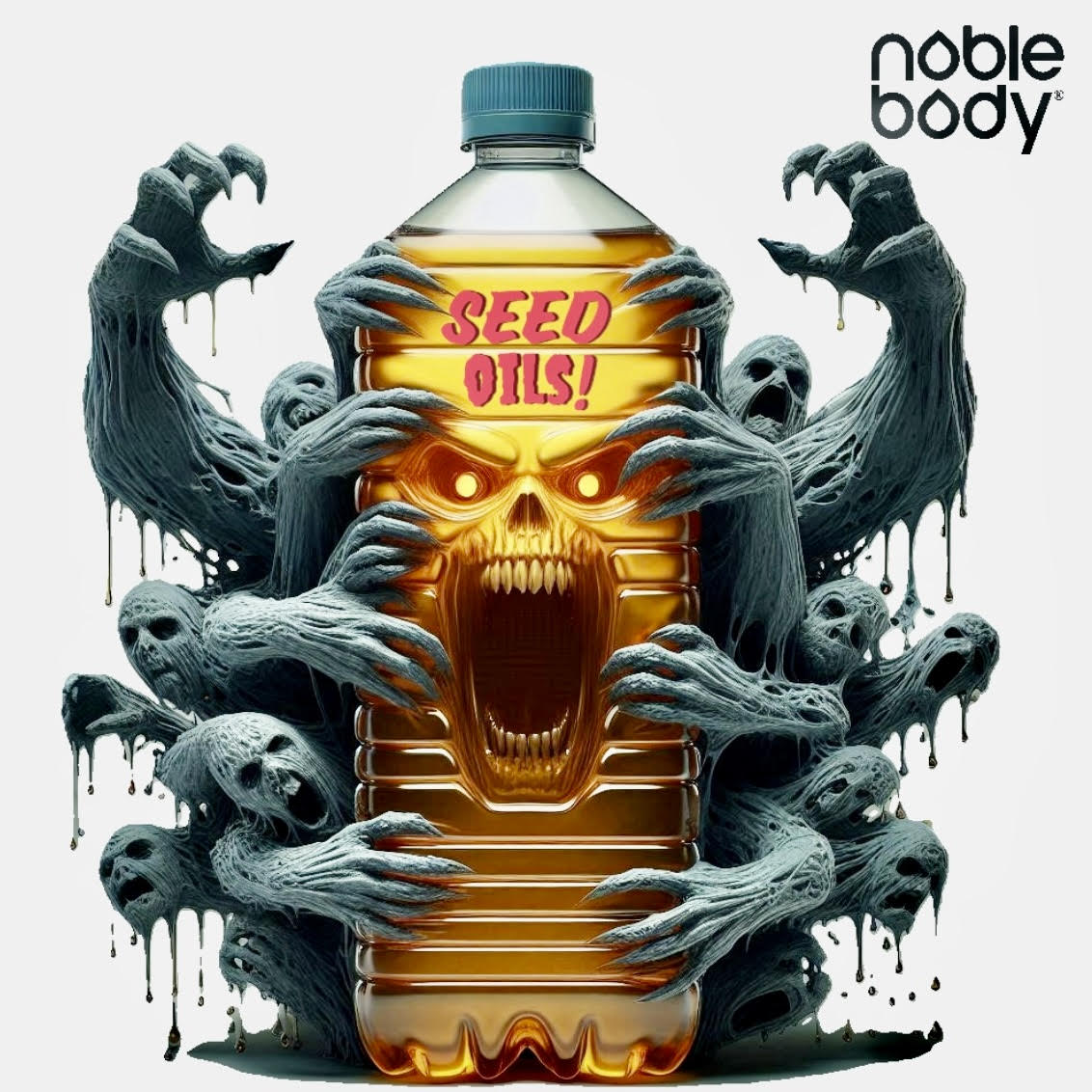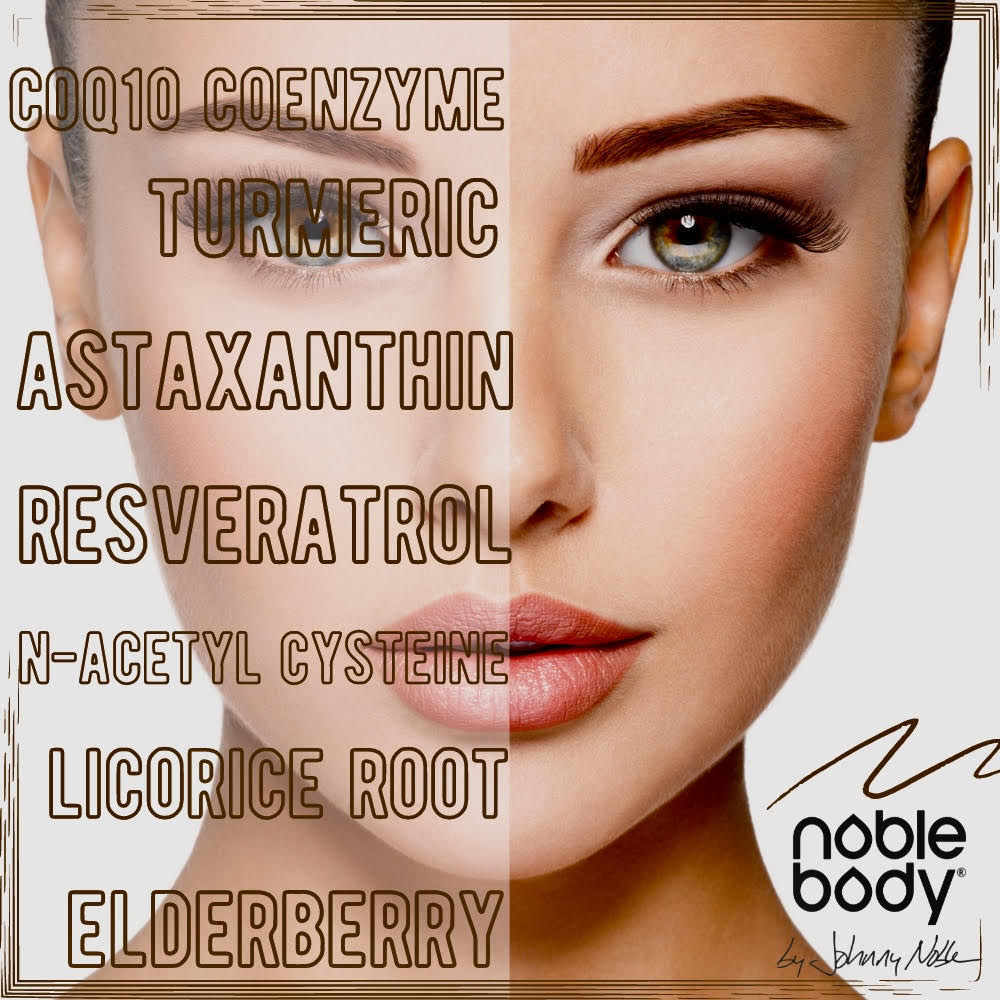Seed Oils! Are they all toxic, or is there more to the story?
Your complete guide to the horrible (& great) seed oils to consume & for topical skin & hair care.
The hate for “seed oils” is a recent phenomenon. It's taken WAY too long to catch on, but now It’s impossible to avoid the topic on social media. Many people are finally becoming aware that consuming certain seed oils or “vegetable” cooking oils has catastrophic health impacts.
Seed oils were blasted into public awareness by RFK Jr. during a speech in Arizona on August 23. Internet searches for “seed oils” spiked and many people will now become educated on the health dangers of this corporate franken-monster.
RFK said seed oils are “one of the most unhealthy ingredients that we have in foods” and “one of the worst things you can eat.” Strong words, but is this true?
However, like any complex (and trendy) topic, there is great misunderstanding about what seed oils are “bad,” what oils are “good,” and the “why” behind it all.
This misunderstanding has leaked into my world of natural oils and other natural compounds (for skin and hair care) where I’ve seen outlandish (and wrong) claims that all seed oils are also bad topically for skin and hair care. In other words, when it comes to ANY seed oils, let’s throw the baby out with the bathwater.
I’ve even seen “seed oil free” skin products recently. Once you see why some seed oils are horrible and how many are beneficial, you’ll understand the absurdity of that notion.

TLDR SUMMARY
All seed oils are NOT harmful to good health. In fact, many seed oils have been used for thousands of years and have near miraculous health benefits. Whether for consumption, skin, or hair care, MANY seed oils are undisputed superstars. Nature does indeed have all the answers.
IT IS ONLY A SMALL GROUP OF SEED OILS AND THE WAY THEY ARE GROWN, CULTIVATED, INDUSTRIALLY PROCESSED, AND THEN ADULTERATED WITH CHEMICALS THAT MAKE THEM TOXIC TO OUR HEALTH. Those are the oils to avoid for ANY uses. Read on to learn all you need to know about which seed oils to shun, those to welcome into your personal care and diet routines, and the “why” behind it.
TWO CLEAR SEED OIL EXCEPTIONS
BLACK SEED OIL: (nigella sativa) is… you guessed it… A seed oil.
OH NO! Throw it away, right? Ha. NO. (I take it most days, like a supplement. As do many others.)
Go on Twitter/X, Amazon, or any other social media site and see the raving descriptions, hundreds of products for sale, and the reviews in favor of black seed oil. Thousands of posts and examples will overwhelm you.
If you go deeper, you can get bogged down for months in many hundreds of studies about its almost miraculous curative properties and uses by humans for thousands of years.
So, a “seed oil” with great benefits that’s loved by all? Are you confused yet?

CAMELLIA OIL: (camellia sinensis) a “Skincare Secret of Japanese Geishas.” This luxurious oil is derived from the seeds of camellia fruits. It’s sometimes called "tea seed oil" (NOT the same as tea tree oil. Different oil entirely.) It is also edible and has been called the "Oriental Olive Oil."
It has been used for centuries in many parts of Asia and is widely thought to be a secret behind the youthful beauty of Asian women and is renowned for its skin and hair benefits.
It’s loaded with vitamins A & E, squalene (also found in human sebum), beneficial minerals, and is a voracious antioxidant and free-radical scavenger. It has anti-inflammatory benefits and has a sound reputation as an anti-aging oil because of its ability to prevent collagen breakdown, rejuvenate skin, and reduce the appearance of wrinkles.

(Camellia Oil is featured in the Noble Body Shine Hair Oil.)
Do these two sound like “seed oils” worthy of hatred? NO. Obviously not. There are many other examples (below) like the beloved black seed and camellia oils.
WHAT ARE SEED OILS
Natural oils are sourced from many types of plant and botanical materials. (Also like essential oils, which is an entirely different category of natural compounds.) These sources include fruits, nuts, beans, berries, kernels, seeds, and other sources like coconuts, olives, and flowers.
These oils have been used by humans for thousands of years for many different purposes such as cooking, food sources, lamp oil, heating, medicinal, pain relief, topical, hair care, sun protection, to repel pests, industrial uses, cosmetics, and the list goes on.
Many of these oils have fantastic and numerous health benefits. The nasty, toxic, big-corporate seed oils are a recent development.
WHAT ARE THE WORST SEED OILS
There is a narrow group of oils, more accurately called “industrial seed oils” or the perversely misnamed “vegetable oils” that ARE worthy of the hate they are receiving.
The main culprits in this nasty cabal are:
cottonseed, soybean, corn, rapeseed (aka “canola”), sunflower, safflower, and grapeseed.
(NOTE: it’s the growing, GMO, treatment, pesticides, high degree of industrial processing, and chemical adulteration that’s the real problem with these oils.)
For example, sunflower, safflower, and grapeseed oils can be good or horrible depending on how they are processed. All three are also widely used in the cosmetics industry as “carrier oils.” And even rapeseed (canola) oil can be organic and expeller pressed with no other adulteration. (Yes, it’s true.)

HOW INDUSTRIAL SEED OILS ARE PROCESSED
First, these are typically the big-corporate large farming operations, and the raw materials are likely of GMO origin. (To make it worse, these crops are also heavily subsidized by the US federal government.) And if you want a lot more of something, subsidize it.
They are also treated with the worst offending herbicides and pesticides (such as ultra-toxic Glyphosate), that always end up in the final product. Many of these seeds are not bursting at the seams with oils, like say olives or avocados, so it takes industrial effort to extract them in large quantities.
The seeds are first gathered from the plant material. They are then heated to high temperatures to sterilize the seeds and for ease of extraction. BUT, this also causes the unsaturated fatty acids to oxidize generating free radicals that cause oxidative stress and inflammation in the human body.
The seeds are then typically crushed/pressed (creating more heat) and further processed with a petroleum-based solvent like hexane to maximize oil extraction. Then this material is deodorized which can also create trans-fats.
Then more chemicals may be added to make the color and odor more uniform and neutral. (“RBD” or refined, bleached, and deodorized is another common industry term for these oils.)
As you can see, this does not even resemble a “food” product that should be consumed by humans. Nor should it be used for ANY purpose such as for skin and hair care.
And yet massive shelf space in grocery stores is devoted to this toxic sludge in the plastic bottles that is promoted as “heart healthy!” This is criminal insanity on an industrial scale.
WHERE AND WHEN THE SEED OIL MONSTER WAS BORN
Here’s a quick story that reveals the dark side of the seed oil saga. It began over 100 years ago with William Procter and James Gamble who were soap makers centered in Cincinnati, a commerce mecca of the time.
In that era, soap had been made from rendered pork fat. This was before refrigeration, so pork was subject to quick spoilage. P & G partnered up and had the clever idea to create a new type of soap not from pork fat, but from “vegetable oils.”
Around that same time, oil had been discovered in Titusville, Pennsylvania and it quickly displaced cottonseed oil as the main lamp lighting and heating fuel source.
Cottonseed oil instantly became an unwanted industrial toxic waste. But here’s the kicker: P & G figured out that cottonseed oil could be used to make their soap.
AND (and this is a big AND…) with the help of their R&D scientists, they figured out how to chemically alter the oil via “hydrogenation” and magically transform it into a solid, “stable” cooking fat that could be kept at room temperature.
With this (evil) corporate wizardry, they transmogrified this toxic waste product into a cooking fat and called it CRISCO. And then they began a media blitz to convince people to avoid animal fats like lard and butter and to favor this “new and improved” cooking oil that did not require refrigeration. Of course it looked like lard on the outside, but the negative effects on human health have been a 100+ year disaster.
As expected, the “vegetable oil” floodgates opened with soybean, corn, canola (rapeseed), and other industrial-processed oils. They were cheaper for the consumer (who was in the dark about any detrimental health effects) and heavily promoted by the companies producing them as the latest, greatest healthy thing.
And to this day, these “vegetable (seed) oils” dominate grocery shelves and millions of people remain oblivious despite their ballooning waistlines, swollen ankles, exploding hearts, cancers, diabetes, and many other metabolic health problems. The crime of last century? There’s a lot to choose from, but the seed oil scam ranks at the top of that list.
WHY THESE SEED OILS ARE SO BAD FOR HUMAN HEALTH
This can be a long article by itself, so here’s a summary of why industrial seed oils internally damage the human body.
These oils contain high levels of omega-6 polyunsaturated fatty acids (the “PUFA” you’ve heard of), particularly linoleic acid. Although these fatty acids are essential for the human body, an imbalance of omega-6 to omega 3 fatty acids will lead to chronic (body-wide) inflammation and a host of resultant and serious health problems.
(AND, as noted above, these “vegetable oils” are from pesticide laden GMO crop sources, blasted with extreme heat, unstable and oxidized creating mass amounts of free radicals, and then adulterated with chemicals to make them smell and appear more palatable, like ummmm, food.)
This critical connection is just coming into the mainstream recently, even though these industrial seed oils and the misnamed “vegetable oils” have been peddled as “heart healthy” for many decades. Perversely, it’s the exact opposite that’s true. Humans are not biologically adapted to consuming what amounts to toxic industrial waste.
The ideal human diet should maintain a balance of 1:1 between omega 6 and omega 3 fatty acids as both are vital for good health. Our modern diet has shifted the omega 6 to 3 intake by an extreme margin (10:1-20:1) for scores of people, which is a likely explanation for ballooning health problems and waistlines.
I would urge you to avoid these industrial seed oils as much as possible. These harmful compounds are in nearly every form of processed foods. Look at the ingredient lists and you will see them everywhere. It’s impossible to avoid these toxic oils if you consume any processed foods.
And of course, most restaurants and especially fast-food restaurants use them for nearly everything, especially cooking fried foods. (Although there is a recent trend of restaurants announcing that they use “no seed oils,” which is needed and refreshing.)

Stop consuming these industrial toxic sludge oils and instead use high quality olive, avocado, ghee, butter, duck fat, tallow, beef fat/shortening, coconut, black seed, red palm fruit, and even pure lard.
All of these are WAY healthier options. I know most people have been brainwashed otherwise, but it’s true. (But be forewarned: many olive and avocado oils are FAKE, and that’s entirely another story so learn to discern which companies sell authentic oils.)
See this recent and updated study on fraudulent avocado oils on the market:
“Purity and quality of private labelled avocado oil”
We’ve covered the WORST, so let’s talk about the BEST seed oils…
HOW SEED OILS CAN BE GREAT
Yes, it’s true and it’s been a fact for many thousands of years. Some natural seed oil compounds are AMAZING for skin and hair health and beauty. So how can this be true?
It’s simple really. There are three main factors:
- Type of source material
- Growing and cultivation
- Processing methods
There are so many great natural (yes, seed) oils that it’s nonsensical to lump them in the same category as the industrial processed seed/vegetable oils. They are as far apart as crack cocaine and creatine supplement powder.
They are non-GMO (and many are wildcrafted), grown without pesticides, gently processed with cold or similar expeller pressing. And most important, these oils maintain their purity and nutrient contents, so we can receive all the benefits, whether for consumption or skin and hair care. It is a night and day distinction between your standard “vegetable oils” and rosehip seed, camellia, black seed, or jojoba oils, just to name a few.
And that brings us to…

THE SKIN AND HAIR CARE SEED OIL SUPERSTARS
Many books and papers have been written about beneficial seed oils and their amazing compounds. Plus, thousands of years of use and thousands of positive studies. And we’re just scratching the surface on the amazing benefits hiding in these pure and natural compounds. I’ve already covered some of it.
HERE:
NINE OF THE BEST NATURAL OILS FOR BEAUTIFUL GLOWING SKIN
and HERE:
YOUR ULTIMATE GUIDE TO NATURAL OILS

And there's more: These are all “seed oils” that are used in thousands of "luxury" products in the cosmetics/personal care industry. Many are common and widespread, and some of them are quite exotic:
rosehip; sea buckthorn, evening primrose; pomegranate; raspberry; cranberry, carrot, black cumin; goji, pumpkin; borage; black currant; argan; babassu; meadowfoam; “tea seed” (aka camellia); jojoba; sesame, amaranth, castor; flaxseed, hemp, coriander, hibiscus, papaya, perilla, milk thistle, and it’s crazy but there are many more…
These oils are produced from non-GMO, pure, natural, and often organic sources and are loaded with nutrients and beneficial compounds, which are not destroyed by the heat, pressure, and chemicals of industrial processing.
These beneficial compounds include: triglycerides, triterpenes, flavonoids, essential fatty acids, tocopherols, vitamins A,C,D,E, zinc, minerals, polyphenols, sterols, stanols, phospholipids, waxes, phenolic compounds, anti-bacterial/anti-fungal compounds, flavonoids, squalane, squalene, triterpenes, and many others depending on the source oil. Remember, skin and hair need nutrition too!
These compounds are being studied for many properties and cures:
multiple forms of cancers; analgesic; anti-inflammatory; anti-tussive; anti-virus, bacteria, fungi, parasitic; metabolic syndrome; hypertension; diabetes; kidney and liver disorders; cognitive impairment; celiac disease; and many, many more that are just coming into focus.
As you can see, it’s nonsensical and uninformed to lump all of these amazing and beneficial seed oils into the same category as the dreaded toxic industrial seed oils. That’s why we need to rely on nuance and deeper understanding of these compounds, how they are grown and processed, and their actual effects on the human body.
CONCLUSION
It’s great news that more people are catching on to the catastrophic health evils of the big corporate industrial seed and misnamed “vegetable oils.” It’s equally important that the amazing health benefits of MANY OTHER “seed oils” don’t get lumped into this terrible gang simply by association and basic misunderstanding.
It’s as absurd as throwing away every white powder in your house because cocaine is also a white powdery substance. Many seed oils have been used and enjoyed by humans for millennia and many of their health and healing powers are just beginning to come into focus. It’s important for us to discern between the good and the evil seed oils.
For all we know, a cure for cancer may be found in black seeds or the cure for Alzheimer’s may be found in a pomegranate seed.
************************************************************
Regards and many thanks for reading.
My prime directive with Noble Body is to produce healthy and natural skin and hair care products using only the finest ingredients. I will never deviate from this promise.
And now we are moving into natural compounds as food and supplements.
Peace, great skin, health and Love to everyone.
Johnny Noble, August, 2024
noble-body.com
support@noble-body.com
©Noble Body LLC 2024


